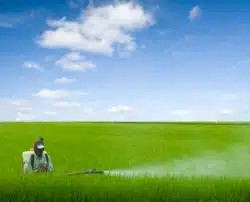 Glyphosate was introduced to the market by Monsanto in 1974 in an aggressive weed killer marketed under the name Roundup. The herbicide may be sprayed on a variety of glyphosate-resistant crops including corn, cotton, and soybeans. Monsanto also produced crops specially engineered to resist the chemical.
Glyphosate was introduced to the market by Monsanto in 1974 in an aggressive weed killer marketed under the name Roundup. The herbicide may be sprayed on a variety of glyphosate-resistant crops including corn, cotton, and soybeans. Monsanto also produced crops specially engineered to resist the chemical.
In addition to the widespread use of glyphosate by commercial crop farmers, the chemical is used by landscapers, groundskeepers, park workers, gardeners, and homeowners to control the spread of invasive plants.
Although glyphosate is the most popular herbicide in the world, recent research indicates that exposure to Roundup and other glyphosate-based products may cause cancer.
In March 2015, the World Health Organization’s International Agency for Research on Cancer (IARC) concluded its research into the possible side effects of glyphosate. According to the IARC, glyphosate is probably carcinogenic to humans. The research conducted by the organization indicates that exposure to the chemical may damage or mutate cell DNA and cause non-Hodgkin lymphoma.
More recent research by the University of Washington found that exposure to glyphosate may increase the risk of developing cancer by more than 40 percent, CNN reported.
Due to the health concerns associated with glyphosate exposure, many countries, as well as U.S. states and cities, have banned the use of the chemical.
Do Canadian Farmers Use Glyphosate?
Although the use of glyphosate has been banned or restricted in many places, the chemical is still widely used in Canada. Canadian farmers use glyphosate on crops including corn, soy, and wheat. The chemical is also used in forestry and land management, according to The National Observer. For more than 10 years, glyphosate has been the most widely sold pesticide in Canada. Carex Canada reports that between 37,000 and 55,000 Canadian farmers use glyphosate and are exposed to the dangerous chemical every year.
While glyphosate is still widely used in Canada, it has been banned in Austria, France, Italy, Bermuda, Vietnam, and several other nations. Some countries are also banning other fungicides and herbicides, in addition to glyphosate. In order to control the spread of weeds without using harmful chemicals, some countries, including Australia, are looking into alternative methods of weed control. Precision weed management, or the use of digital weed seekers that only spray herbicide where weeds are growing, is a popular method. Another is the use of machines that employ cameras to locate weeds in order to dig them out.
Following its acquisition of Monsanto in 2018, Bayer’s stock value has fallen by approximately $40 billion due to the allegations surrounding Roundup. Several Roundup lawsuits have resulted in multi-million dollar settlements for victims, and thousands of cases are still pending.
If you have been diagnosed with non-Hodgkin lymphoma after being exposed to Roundup, you may be eligible to hire a lawyer and file a class action lawsuit against Bayer regarding the weedkiller. Victims who file lawsuits may be able to recover compensation for medical expenses, injuries, pain and suffering, and other damages.
Do YOU have a legal claim? Fill out the form on this page now for a free, immediate, and confidential case evaluation. The Canadian lawyers who work with Top Class Actions will contact you if you qualify to let you know if an individual Roundup glyphosate cancer lawsuit or Roundup class action lawsuit is best for you. [In general, Roundup lawsuits are filed individually by each plaintiff and are not class actions.] Hurry — statutes of limitations may apply.
ATTORNEY ADVERTISING
Top Class Actions is a Proud Member of the American Bar Association
LEGAL INFORMATION IS NOT LEGAL ADVICE
Top Class Actions Legal Statement
©2008 – 2026 Top Class Actions® LLC
Various Trademarks held by their respective owners
This website is not intended for viewing or usage by European Union citizens.
Get Help – It’s Free
Join a Free Canada Roundup Class Action Lawsuit Investigation
U.S. citizens, click here for the U.S. Roundup Cancer Investigation.
If you qualify, an attorney will contact you to discuss the details of your potential case at no charge to you.
PLEASE NOTE: If you want to participate in this investigation, it is imperative that you reply to the law firm if they call or email you.












